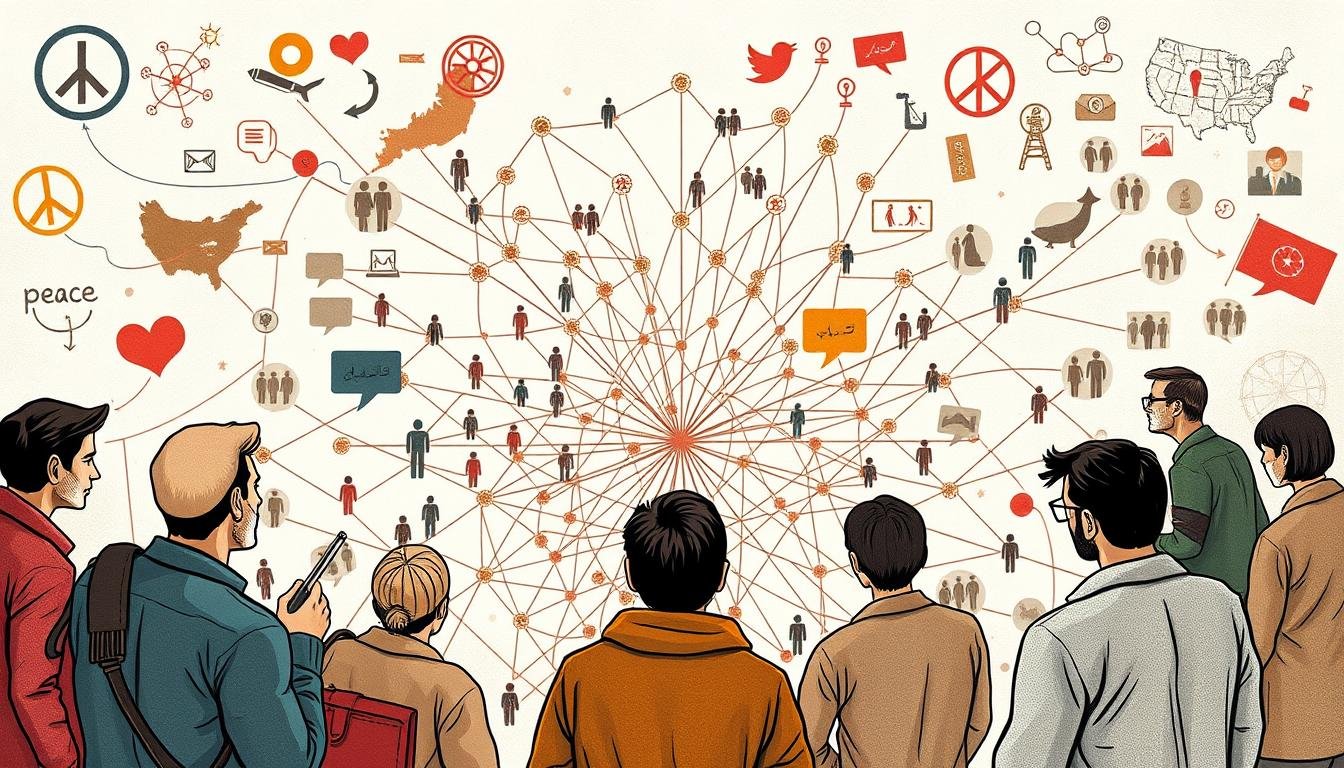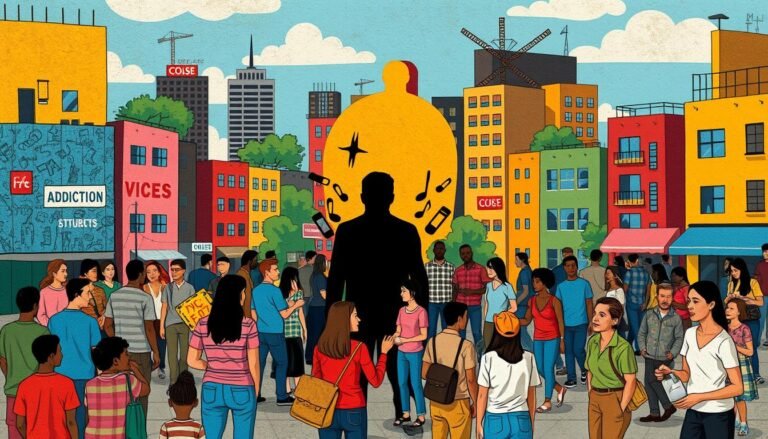Sociological Approaches to Understanding Terrorism
In today’s world, we face the challenge of terrorism. Can sociology help us understand it better? It’s time to look at the social factors that lead to extremist beliefs and violence.
Terrorism sociology digs deep into this issue. It offers insights that go beyond what we see in the news. By looking at the causes of terrorism, we can understand it better.
This field makes us think differently about terrorism. It looks at the social settings that push people towards extremism. We see how groups, culture, and global trends play a part in terrorism.
We’ll see how sociologists study terrorism. They use theories and methods to help us understand it. We’ll look at how social movements and media affect how we see terrorism.
Key Takeaways:
- Terrorism is a complex social phenomenon requiring multidisciplinary analysis
- Sociological perspectives on terrorism focus on group dynamics and social contexts
- The root causes of terrorism are often rooted in perceived threats to group identity
- Social movement theory provides a framework for understanding political violence
- Media and public sentiment play crucial roles in shaping responses to terrorism
Introduction to the Sociology of Terrorism
The study of terrorism looks at it from a social view. It uses insights from political science, history, and psychology. This helps us see why people join terrorist groups and how it affects society.
Defining Terrorism from a Sociological Perspective
Sociologists see terrorism as a product of culture and politics. They look at how groups use violence to push for change. They also study what makes some societies more prone to radical ideas.
The Importance of Studying Terrorism Through a Sociological Lens
Looking at terrorism through sociology gives us deep insights. For example, in 2010, the International Journal of Human Sciences published 200 articles on terrorism and religion. These studies used three main theories: Functionalism, Conflict Theory, and Symbolic Interactionism.
Overview of Key Sociological Concepts in Terrorism Studies
Sociological theories on terrorism focus on social networks and group behavior. After the September 11th attacks, Social Network Analysis (SNA) became key for understanding terrorist groups. Researchers now study how group connections affect radicalization and identity.
“Understanding motives and processes leading to political violence requires looking beyond apparent causal relations between the causes of violence and violent activities.”
This new view shows the importance of looking at the social side of terrorist groups. It moves us from just looking at individuals to understanding the complex nature of terrorism.
Historical Development of Sociological Approaches to Terrorism
The study of terrorism has changed a lot over time. Before 9/11, researchers looked at moral panic, how groups reacted, and media coverage. After 9/11, the focus shifted to a deeper look at the social aspects of terrorism.
In 2004, a key study by Weinberg, Pedahzur, and Hirsch-Hoefler looked at 73 different definitions of terrorism. They found that terrorism is “a tactic used for political goals, involving threats or violence. It aims for publicity.” This view sees terrorism as a way to send a message.
After 9/11, experts like Mathieu Deflem, S. E. Costanza, and John C. Kilburn Jr. pushed for a special area in sociology for studying terrorism. This field covers many topics:
- Military spending and counter-terrorism measures
- Immigration policies and privacy issues
- The Israeli-Palestinian conflict
- Societal reactions to terrorism
Now, sociologists are looking into how 9/11 caused moral panic and spending. They’re facing challenges in studying homeland security because terrorist attacks are rare. This shows how our understanding of terrorism is always evolving.
Theoretical Frameworks in the Sociology of Terrorism
Sociological theories of terrorism give us deep insights into political violence. They help us see how terrorist groups start, work, and change in society. Let’s look at three main ways these theories shape our understanding of terrorism.
Social Construction Theory
This theory looks at how societies create common meanings of terrorism. It shows how media, politicians, and public talk shape our views of terrorist acts. For instance, the Oklahoma City bombing got a lot of media attention. This affected how policy makers and the public thought about it.
Collective Behavior Theory
Collective behavior theory studies how groups form and act under social conditions. It explains why people join terrorist groups and take part in extremist actions. This view looks at things like shared complaints, social networks, and group behavior in becoming radical.
Social Movement Theory
Social movement theory sees terrorism as a political action in a bigger social setting. It looks at how terrorist groups get resources, share their messages, and deal with other political groups. This view helps us see terrorism’s part in big social and political fights.
These sociological views on terrorism give us key tools for studying this complex issue. By looking at social factors, group behavior, and the wider society, researchers can come up with better ways to stop and fight against extremist violence.
The Role of Social Factors in Terrorist Radicalization
Social factors deeply influence the radicalization process. Studies show that social networks shape extremist beliefs and actions. A 2020 report found that group dynamics and connections, both online and offline, help in radicalization.
Identity processes are key in moving towards extremism. Social identity theory explains how people join radical groups for a sense of belonging. This often comes from feeling wronged by society.
Economic factors also affect radicalization. Research links economic struggles to terrorism. Financial difficulties can make people more open to extremist ideas.
“Understanding the social context of radicalization is crucial for developing effective counter-terrorism strategies.” – Professor Bruce Hoffman
Big events like 9/11 can make social factors worse. Increased discrimination and hate crimes against certain groups can lead to extremism. For example, Arab Americans suffered from more mental health issues after 9/11 due to discrimination.
It’s important to understand these social influences to prevent and stop radicalization. We need to challenge beliefs that support violence and help people find other identities. Tailored strategies are key to fighting terrorism effectively.
Sociological Approaches to Understanding Terrorism
Sociological methods give us deep insights into the complex world of terrorism. They show how social forces shape terrorist behavior and beliefs. By looking at group dynamics and cultural views, we can understand this global issue better.
Social Identity and Group Dynamics
Terrorist groups create strong social bonds. Members feel they belong and have a purpose. This bond can be so strong, people might act against their own interests.
Research shows that a collectivist mindset can lead to supporting terrorist attacks. This shows how group thinking affects terrorist actions.
Relative Deprivation Theory
This theory says terrorism comes from feeling unfairly treated. People feel they should have more than they do. This builds frustration.
Studies show those who feel less successful in life might support extremist ideas. Joining a terrorist group can give them a sense of importance and meaning.
Cultural and Ideological Factors
Understanding cultural views on terrorism is key. Some see terrorism as a defense against threats to their way of life. For example, Islamic terrorism might be seen as a response to fast globalization.
Terrorist ideologies offer beliefs that justify violence. These beliefs are seen as absolute truths by followers.
| Factor | Impact on Terrorism |
|---|---|
| Social Identity | Creates strong group bonds |
| Relative Deprivation | Fuels frustration and extremism |
| Cultural Factors | Shapes ideological justifications |
Understanding these sociological aspects helps in making better counter-terrorism strategies. By tackling issues like social alienation and cultural clashes, we might prevent radicalization and promote peace.
Terrorism as a Form of Communication
Terrorism is a powerful way to send messages through violence. It uses symbols to make a big impact. Attacks are chosen to be seen and heard by many.
The media greatly affects how we see terrorism. News can make terrorist messages stronger. This shows why reporting responsibly is key.
- Type of attack
- Number of casualties
- Background of the perpetrators
These factors change how we see and react to terrorist acts. They show that terrorism is a form of communication.
| Factor | Impact on Public Perception |
|---|---|
| Attack Type | Influences emotional response and perceived threat level |
| Casualty Count | Affects perceived severity and urgency of response |
| Actor Background | Shapes narrative and potential stereotyping |
Seeing terrorism as a way to communicate helps us fight it better. By understanding its symbols, we can lessen its effects. This helps address the issues driving extremism.
The Impact of Globalization on Terrorist Activities
Globalization has changed how we deal with global terrorism. The world’s connections have led to new challenges in fighting against extremist groups. It’s now key to see how technology and media affect terrorism.
Transnational Networks and Terrorism
Thanks to global communication, terrorists can now connect across borders. These networks are hard to track and stop. In the Arab region, for instance, terrorism has grown due to political and economic issues.
The Role of Technology in Modern Terrorism
Technology and terrorism are closely linked today. Terror groups use tech for recruitment and planning attacks. The internet helps spread their ideas and coordinate actions, making it tough for anti-terrorism efforts.
Global Media and the Spread of Extremist Ideologies
The media’s impact on terrorism is huge. Global media can spread extremist messages. Social media is especially dangerous, creating spaces for radicalization.
“The work reviews quantitative studies to estimate the prevalence of online radicalization in the context of terrorist offending.”
We need a broad strategy to fight these issues. This strategy should tackle threats like poverty and climate change, which drive extremism. By focusing on individual security and rights, we can stop the spread of terrorist ideas worldwide.
Societal Responses to Terrorism: A Sociological Perspective
Terrorism changes how society reacts, affecting law enforcement and public policies. A 2020 report covers 78 pages, looking into how people join extremist groups and radicalize. It uses 61 references to show how communities deal with terrorist threats.
How people see terrorism affects how we fight it. Gibbs (1989) found in the American Sociological Review that people view terrorism in different ways. This view shapes how societies react.
Police have changed how they handle terrorist threats. Kratcoski et al. (2002) looked into preventing, controlling, and recovering from terrorist acts. These changes aim to keep people safe while protecting our rights.
“Only a small subgroup of individuals exposed to traumatic events may develop psychiatric illnesses such as PTSD or major depression.”
The psychological effects of terrorism are huge. Being exposed to traumatic events can lead to stress disorders, depression, and anxiety. This affects how people feel and influences policy.
Webb (2002) points out sociology’s importance in understanding terrorism and disasters today. This view helps create better ways to fight terrorism, taking into account social and community factors.
The Intersection of Sociology and Counter-Terrorism Strategies
Sociology is key in making counter-terrorism strategies work. These strategies aim to fix deep issues and bring people together to stop extremism.
Social Integration Approaches
Making communities inclusive is vital in fighting radicalization. When people feel they belong, they’re less likely to turn to extreme groups. Studies prove that well-connected individuals don’t join terrorist groups.
Community-Based Counter-Radicalization Programs
Community-led efforts are now more popular in fighting terrorism. They bring together local leaders, families, and groups to help those at risk. A study of 154 cases showed that getting the community involved cuts down radicalization.
The Role of Education in Preventing Extremism
Education is crucial in fighting extremist views. Schools can teach critical thinking, celebrate diversity, and help different groups understand each other. Studies link higher education with fewer extremist beliefs.
| Strategy | Effectiveness | Implementation Challenges |
|---|---|---|
| Social Integration | High | Resource intensive |
| Community-Based Programs | Moderate to High | Requires strong local partnerships |
| Education Initiatives | Long-term impact | Curriculum development |
By using these sociological methods, we can make our counter-terrorism plans better and more effective. They tackle the deep causes of extremism.
Ethical Considerations in Sociological Research on Terrorism
The study of terrorism brings up tough ethical questions. Sociologists must walk a thin line between doing right and keeping their research strong. This balance is key in terrorism studies, where the topics are sensitive and the stakes are high.
One big challenge is keeping research subjects safe. Researchers need to protect the privacy and safety of those involved, like former extremists or those at risk. They also need to keep themselves safe while doing this work.
Since terrorist events are rare, finding ways to study them is hard. Old methods often don’t cut it when checking if security measures work. Researchers must find new ways to collect data that follow strict ethical rules.
- Protecting vulnerable research subjects
- Ensuring researcher safety
- Developing ethical data collection methods
- Maintaining objectivity in a politically charged field
Being open is crucial in terrorism research. After 9/11, the U.S. Department of Homeland Security made clear the need for clear communication about how research is done and what’s found. This openness builds trust with the public and other scholars.
As threats change, so must research ethics. With worries about domestic terrorism and targeted violence growing, researchers need to update their methods while keeping ethics in mind. Finding a balance between gaining knowledge and protecting civil rights is a big challenge.
Future Directions in the Sociology of Terrorism
The study of terrorism is changing fast, with new trends setting the stage for the future. Sociologists are ready to face new challenges and bring new ideas to the table. They aim to better understand this complex issue.
Technology is playing a big role in how terrorists act today. The Revolutionary Organization 17 November’s tactics from 1975-97 show how things have changed. Now, with social media and encrypted chats, researchers must update their ways to keep up.
Looking into how people become radical is also important. Studies on Italian female terrorists in the 1970s and 80s showed varied beliefs and jobs. Future studies will look at how these things mix with today’s society and politics to lead to radicalization.
Working together across different fields will be key in moving forward. By mixing insights from psychology, political science, and data analysis, researchers can get a clearer picture of why terrorists act the way they do. This teamwork will help tackle the challenges faced by scholars like Kilburn and Costanza in evaluating how well counter-terrorism works.
Source Links
- Sociology of terrorism
- The Contribution of Social Movement Theory to Understanding Terrorism
- Microsoft Word – 1081-3115-1-RV.doc
- Social control and the policing of terrorism: foundations for a sociology of counterterrorism – The American Sociologist
- Social Network Analysis in the Study of Terrorism and Political Violence
- Psychology of Terrorism
- Developing a sociological theory for the empirical understanding of terrorism – The American Sociologist
- Social Determinants of Health, Violent Radicalization, and Terrorism: A Public Health Perspective
- Social Identity Theory and the Study of Terrorism and Violent Extremism
- How Radicalization to Terrorism Occurs in the United States: What Research Sponsored by the National Institute of Justice Tells Us
- Understanding terrorism
- Social Network Analysis as an Approach to Combat Terrorism: Past, Present, and Future Research – Homeland Security Affairs
- Understanding the Psychological Consequences of Traumatic Events, Disasters, and Terrorism – Preparing for the Psychological Consequences of Terrorism
- Dialectical Relationship Between Terrorism and Human Security: A Sociological Approach
- Terrorism and the internet: How dangerous is online radicalization?
- Psychology of Terrorism
- Gary LaFree | START.umd.edu
- Department of Homeland Security Strategic Framework for Countering Terrorism and Targeted Violence
- The ethics of researching ‘terrorism’ and political violence: a sociological approach
- FRD — The Sociology and Psychology of Terrorism







